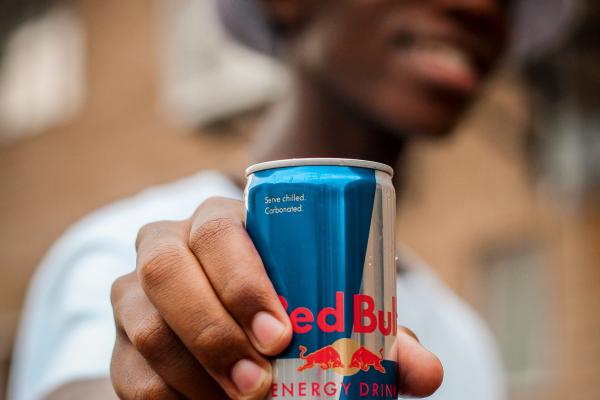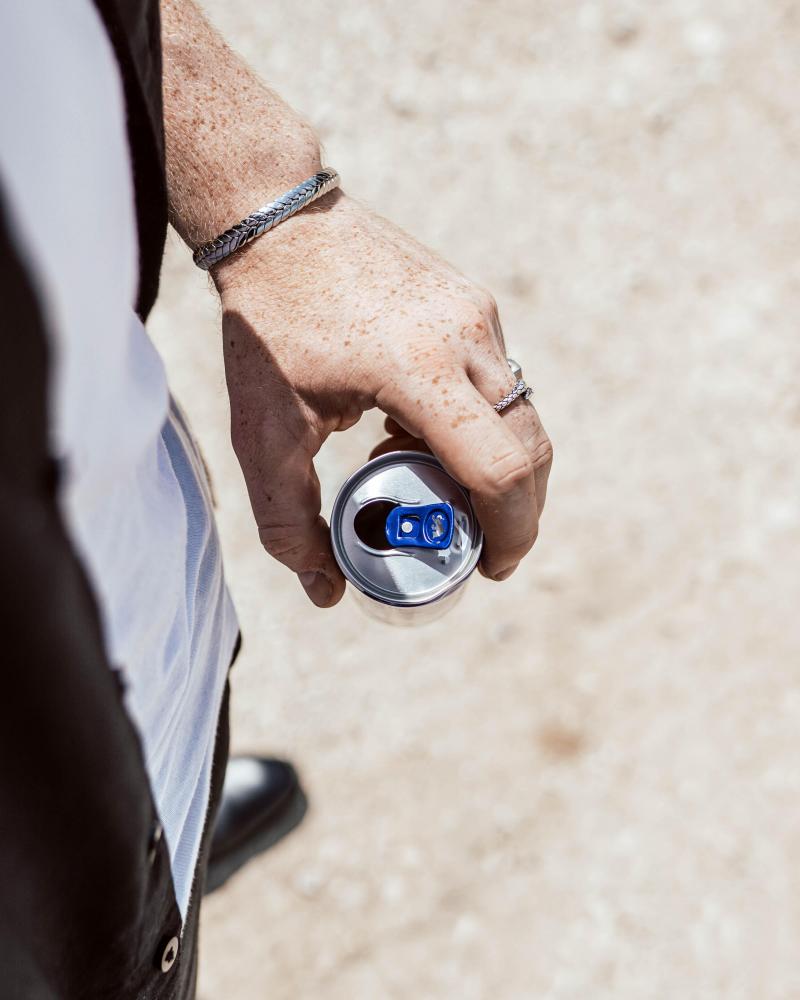Energy drinks
Energy drinks are drinks with a large amount of caffeine and sugars that cause a short-term energy spike.
I drink an energy drink during exams to stay awake.

Did you know this?
Energy drinks such as Red Bull, Monster and Rockstar are popular, especially among young people. Sixty per cent of children and young people drink energy drinks, 18 per cent of them daily. Almost 1 per cent of young people drink up to three units a day. Students often consume energy drinks during exam periods. Energy drinks are unhealthy and do not really help against fatigue. What's more, you can become dependent on them.
What do energy drinks do to your body?
In the short term
Energy drinks contain three times more caffeine than soft drinks. They have a direct effect on the body. The high dose of caffeine stimulates the central nervous system, makes the heart beat faster and increases blood pressure. This creates a short-lived feeling of increased energy. Memory, alertness and motivation also improve to a small extent.
The energy peak is short-lived. Afterwards you often feel twice as tired. The high dose of caffeine also does something to the brain. This explains why you may have a kind of craving, i.e. a desire to have anther energy drink.
In the long term
In the long term, there is also a risk of negative effects. Too many energy drinks can lead to complaints such as restlessness, anxiety, irritability and headaches.
Energy drinks are:
- very acidic, so they also damage your tooth enamel.
- not thirst quenching. In fact, they can be dangerous because they can dehydrate you. Therefore, you should not drink them before or during exercise.
- very high in calories and are therefore a major contributor to people becoming overweight or obese.
Combining alcohol and energy drinks is dangerous. The uplifting effect of the energy drink causes you to overestimate yourself and to feel the effects of alcohol less, which leads you to drink more.
The effect of caffeine: different for everyone
The effect of caffeine is not the same for everyone, and what is too much varies greatly from person to person. As a young person, you are more vulnerable to the effects of caffeine because you are smaller, weigh less and are in a growth phase.
The maximum recommended dose of caffeine is 2.5 mg per kilogram of body weight per day. The consumption of energy drinks is not recommended for pregnant or lactating women, children under 16 or people who are sensitive to caffeine.

When do energy drinks become problematic?
The excessive consumption of energy drinks can lead to caffeine intoxication. Symptoms of intoxication include nausea, vomiting, headaches, palpitations, irritability, anxiety and tremors. In rare cases, it also leads to more serious complications such as hallucinations and convulsions.
Symptoms of caffeine intoxication often disappear spontaneously within a day. However, contact your doctor or the Poison Control Centre immediately (070 245 245) if you feel unwell. A hospital admission is usually not necessary.
The regular use of energy drinks can also lead to dependency. If you reduce or stop drinking caffeine after a period of excessive use, you may experience withdrawal symptoms such as fatigue, nervousness and poor sleep. Withdrawal symptoms vary from person to person - some people experience them more than others.
Tips for more energy
Are you tired or do you have trouble concentrating while studying? The best guarantees for getting through the day (or night) in an optimal way are:
- enough sleep;
- regular exercise;
- drinking water;
- a healthy and balanced diet;
- taking short (power) naps.
Getting started
The online self-help programme Healthy Lifestyle teaches you to build a healthy lifestyle and feel better about yourself. The programme focuses on varied eating and fun exercise. Once you have completed the programme, you will know how to incorporate healthy eating and exercise into your life.
I wasn't aware of the harmful effects of energy drinks. But after drinking three cans in the cramming period, I felt really sick, and had palpitations. I really thought I was going to pass out. The doctor helped me to stop drinking them.
Talk about it
Do you remain tired, or do you often experience difficulty concentrating? Have a conversation with someone you feel comfortable with and trust, like a good friend, your parents, sister or brother. This can bring relief and help you sort things out. You can also find help together.
If you don’t immediately have the courage to tell someone in your direct surroundings, then try to approach someone who is familiar with similar experiences, such as a GP or a student counsellor at your college or university.

Would you prefer to share your story anonymously? You can always call on Awel (102 or awel.be) or Tele-Onthaal (106 or tele-onthaal.be). If you have suicidal thoughts or questions about suicide, contact the Suicide Hotline (1813 or zelfmoord1813.be). Talking helps.
Seek help
Do you feel that you can't manage on your own? Then it is important to get professional help. You can contact a counsellor who specialises in addiction, for example. More information can be obtained anonymously from Druglijn.be or directly from your doctor.
Multiple types of assistance and help are available, though there is no single magical method that will solve all your problems at once. Practically all types of help have several active elements in common, including:
- enhancing your motivation to quit energy drinks or to reduce your consumption of them
- teaching you to identify risky situations
- enhancing your self-confidence, for example by emphasising your abilities and skills
Worried about a friend?
Do you notice that a friend is overly dependent on energy drinks? Then you may not know what to say or do. Talk about the problem, don't judge but voice your concerns.
Keen to learn, read or hear more about this topic?
Podcasts
TED Talks
Selfhelp
Websites
- Discover the Balanced Eating and Fun Exercises sheet from the Healthy Lifestyle programme. (Dutch)
- The Healthy Lifestyle website provides information on exercise and tips for a healthy lifestyle. You will find the Diet Triangle, the Exercise Triangle and an inspiration booklet on energy drinks and health. (Dutch)
Powerful stories
You are not alone. Get inspired by other students' stories about vulnerability and doubt. But above all about the power of connectedness.
Go to the stories